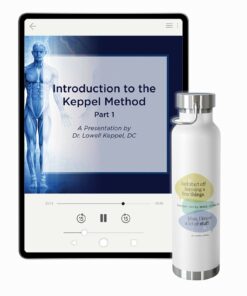Enjoy the latest installment of Dr. Lowell Keppel’s Tip of the Month series by Dr. Royal Lee for practitioners.
During the late 1950s and into the 1970s, Standard Process published the Applied Trophology newsletter. To this day, it is still an important resource full of exceptional information for the practitioner. One of my favorite recurring features in the newsletter is the “Tip of the Month” from Dr. Royal Lee.
Let’s look at what Dr. Lee shared with us from the first half of 1958.
Tip of the Month (Mononucleosis)—January 1958
“Mononucleosis—here’s another so-called incurable disease that seems to respond to nutritional therapy. Favorable results have been reported with the use of six tablets of A-C Complex [Cataplex A-C] and four tablets of Cytotropic Extract of Liver [Hepatrophin PMG] per day in relatively short periods of treatment (one month to six weeks).
“We will be happy to furnish a trial supply free for test cases of this condition.”
I love how Dr. Lee is pretty much to the point, and also how he stands behind his recommendations and products with a FREE trial supply!
Mononucleosis, a viral infection spread via the saliva, is known as the “kissing disease.” Like for any other any virus, Dr. Lee knew the combination of Cataplex A-C provided ammunition for the white blood cells to fight back. In the words of Mark Anderson, “Cataplex C is the poison tip of the spear,” meaning the part of the white blood cell that has the power to neutralize the virus or bacteria. Cataplex A-C also helps with lymphatic drainage, and mono is concentrated in the lymph. Furthermore, the lymph fluid drains to the liver, hence Dr. Lee recommends Hepatrophin PMG. It improves function by taking the assault off the liver (decoy of auto-immune attack) and increasing blood flow through the liver.
Adding Calcium Lactate to this program would be a bonus. Dr. Lee recommended Calcium Lactate to any virus protocol to mobilize white blood cells for phagocytic activity.
Click here for the complete January 1958 issue of Applied Trophology.
Tip of the Month (Relief from Sore Throat)—February 1958
“When aggravated by a raw sore throat, immediate relief can usually be obtained by holding a vitamin D tablet on the back of the tongue until dissolved. Repeat as necessary.”
This tip really hit home for me. I hate getting a sore throat, which is usually the first sign that I’m getting a cold. And, like most (if not all) of Dr. Lee’s tips, this works great!
Next time a patient complains of sore throat, have them suck on a tablet of Cataplex D, just as Dr. Lee recommends. And then be amazed at the results! The mechanism at work here is to get calcium moving. This is exactly what vitamin D does—moves calcium from the gut to the bloodstream.
If you find less than satisfactory results with D alone, try adding Cataplex F to get calcium to the tissue. Follow it up with a teaspoon of Calcium Lactate Powder in water, along with a teaspoon of apple cider vinegar.
Click here for the complete February 1958 issue of Applied Trophology.
Tip of the Month (Epistaxis)—March 1958
“Epistaxis (nosebleed) is known to be caused and aggravated by magnesium hydroxide (milk of magnesia).”
This tip demonstrates how the manmade synthetic form of a mineral can cause undesirable side effects. Of course, the obvious solution here is stop using milk of magnesia.
Vitamin D is great for nosebleeds that occur for no apparent reason. Nosebleeds are associated with a lack of calcium in the blood. Just suck on a tablet or two of Cataplex D, and the nosebleed will dry up. And of course remember to add some Calcium Lactate so the Cataplex D has calcium to move. Other tips for chronic nosebleeds: Strengthen arteries and veins with Cyruta Plus, and improve clotting time with Chlorophyl Complex.
Click here for the complete March 1958 issue of Applied Trophology.
Tip of the Month (Gut Healing and Beef Pituitary)—April 1958
“Some doctors report excellent results in using cytotrophic extract of beef pituitary [Pituitrophin PMG]—in addition to any other indicated supplement—in the treatment of mucous and ulcerative colitis, as well as other stomach and intestinal lesions, to promote faster healing.”
This great tip is based on information from Henry Harrower, MD, author of Practical Endocrinology (available as a free download from the SRP Historical Archives). When you look at Dr. Harrower’s chart of the endocrine system, you see that the pituitary has an antagonistic effect on the duodenum and pancreas. Dr. Lee understood the impact of the endocrine system on digestion. Over the years, this Tip of the Month has served me well for the most stubborn digestive complaints. A few tablets of Pituitrophin PMG often brings the persistent complaints to an end. Dr. Lee even made a supplement specifically for endocrine/digestive issues: Paraplex. This product is comprised of equal parts Pituitrophin PMG, Pancreatrophin PMG, Thytrophin PMG, and Drenatrophin PMG.
Click here for the complete April 1958 issue of Applied Trophology.
Tip of the Month (Corticotrophin and Thymex)—May 1958
“Corticotrophin and its untoward effects: Science Weekly (p. 590, March 1958) reports that corticotrophin (ACTH) administered to test animals over a period of time causes in the female severe arteriosclerosis and in the male polyarteritis nodosa, gastric ulcers, testicular atrophy, and renal calculi, with hypertension occurring in both sexes. Unusually rapid aging was a characteristic of the older animals. Adrenals were enlarged and the thymus was inhibited by the treatment.
“We believe the thymus is the normal antidote to the above-mentioned effects. Thymex is the thymus factor that we believe is the phagocyte activator of the thymus. We know from clinical experience that Thymex opposes the adrenal hormone cortisone. Cortisone blocks phagocyte control of infective processes and must be used with caution where any chronic infection exists. Swollen lymphatic glands, for instance, have shown prompt improvement after the use of Thymex but are aggravated by cortisone.”
Made by the pituitary glands, ACTH (adrenocorticotropic hormone) controls the adrenal production of cortisol. Here Dr. Lee is warning us on the prolonged use of ACTH.
Dr. Lee recommends Thymex (cytosol extract of the thymus gland) as it will oppose cortisone, aka the stress hormone, which many of us produce too much of. Think of Thymex when your patient is stuck in sympathetic flight or fight mode—it can be used to help the body regulate the effects of excess cortisol.
Click here for the complete May 1958 issue of Applied Trophology.
Tip of the Month (Night Coughs in Children)—June 1958
“Coughing at night in children denotes calcium lactate and vitamin F complex deficiency.”
Dr. Lee’s genius of simplicity shows up in his understanding of calcium and calcium metabolism. He observed that the common symptom of coughing at night is an issue of metabolism, and calcium normalizes the metabolism.
From the Therapeutic Food Manual: “The cause, we believe, is a calcium deficiency state secondary to a hypothyroid condition. In this type, the cough is generally worse at night when the metabolic rate is lowered and less diffusible calcium is available for tissue use. This condition is common in children, who almost invariably show other calcium deficiency signs such as restlessness and irritability. A change from pasteurized to raw milk often alters this situation.”
Parents will forever be grateful for this tip. The result is better sleep for the entire family.
Click here for the complete June 1958 issue of Applied Trophology.
I enjoy the Tip of the Month for providing me with so much information I can use to help my patients!
Images from iStock/NiseriN (main), seb_ra (woman with sore throat), Andrey Sayfutdinov (child coughing).







